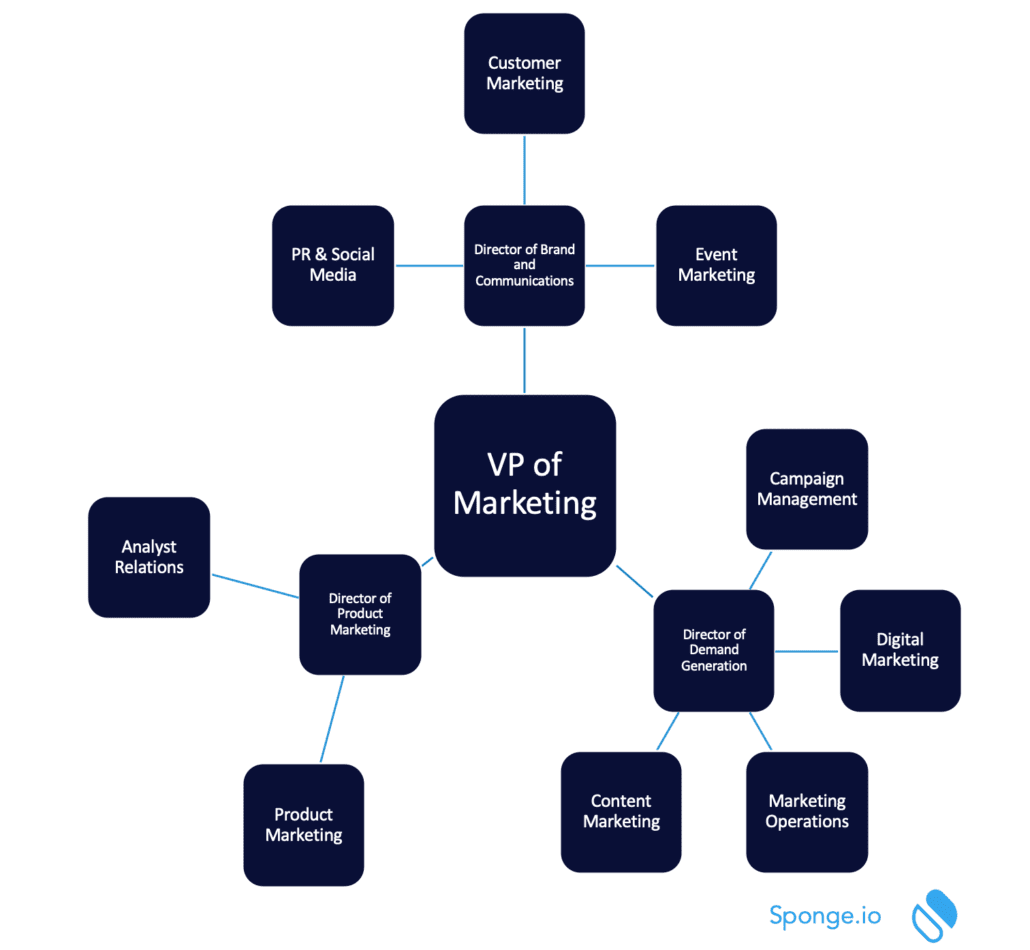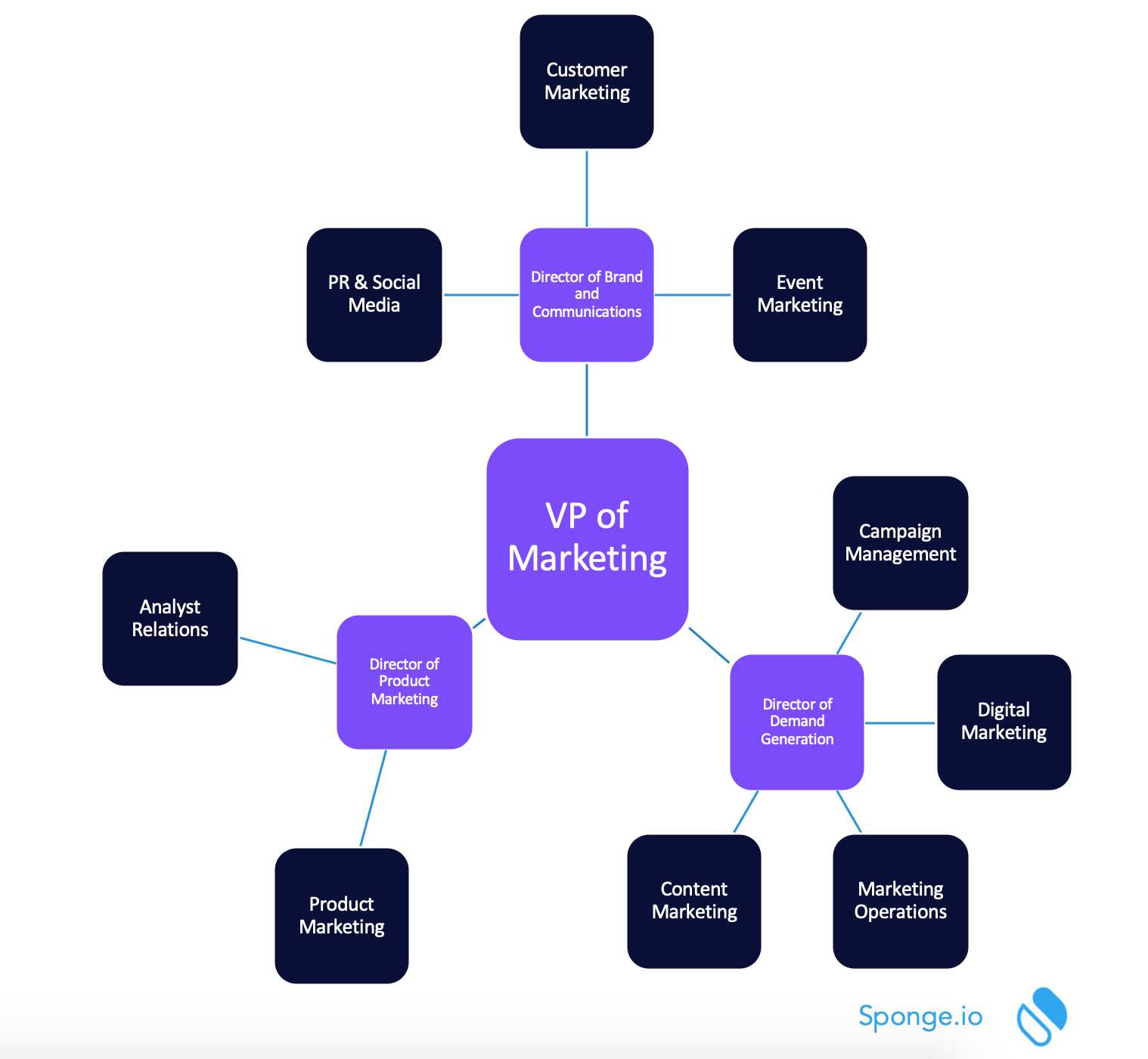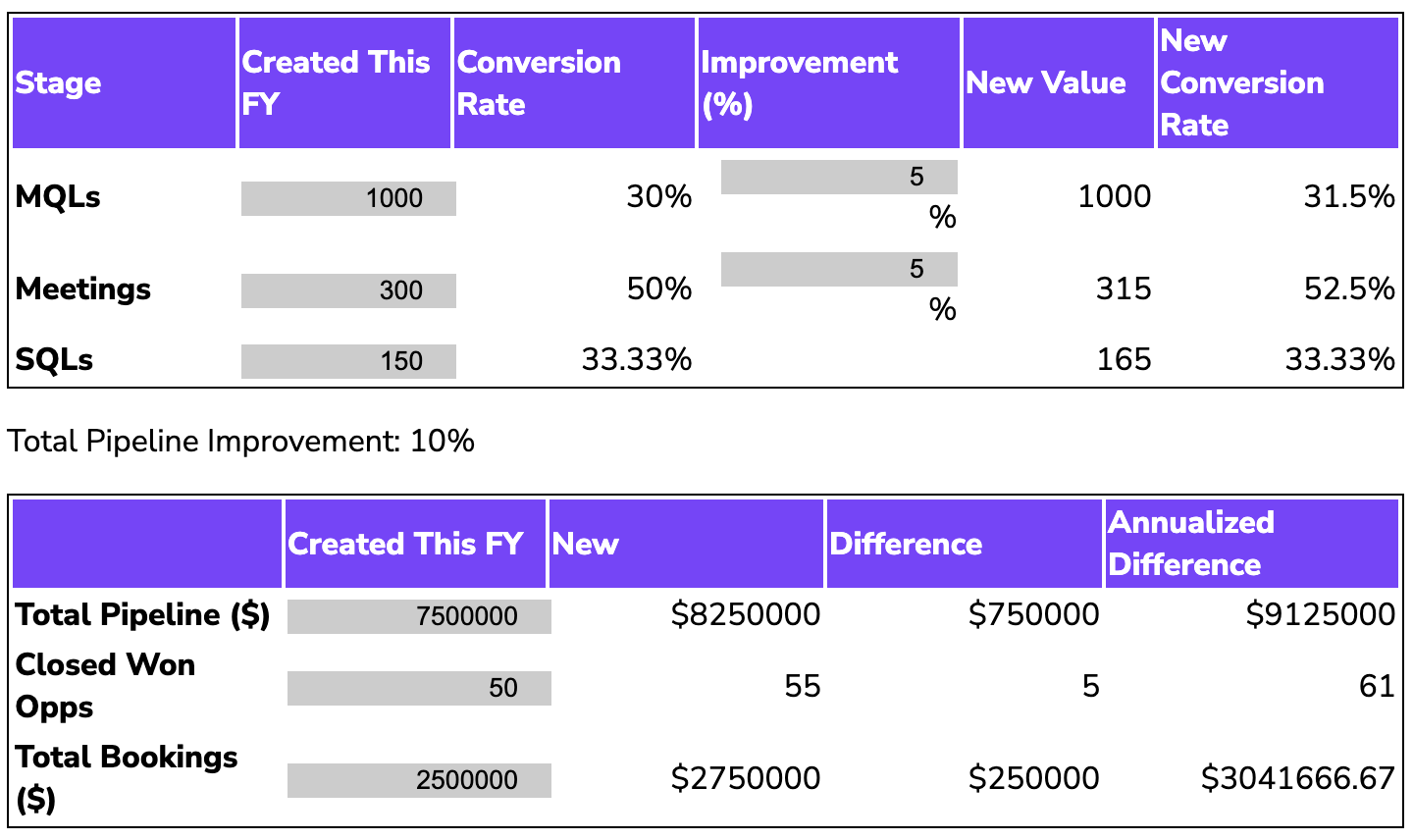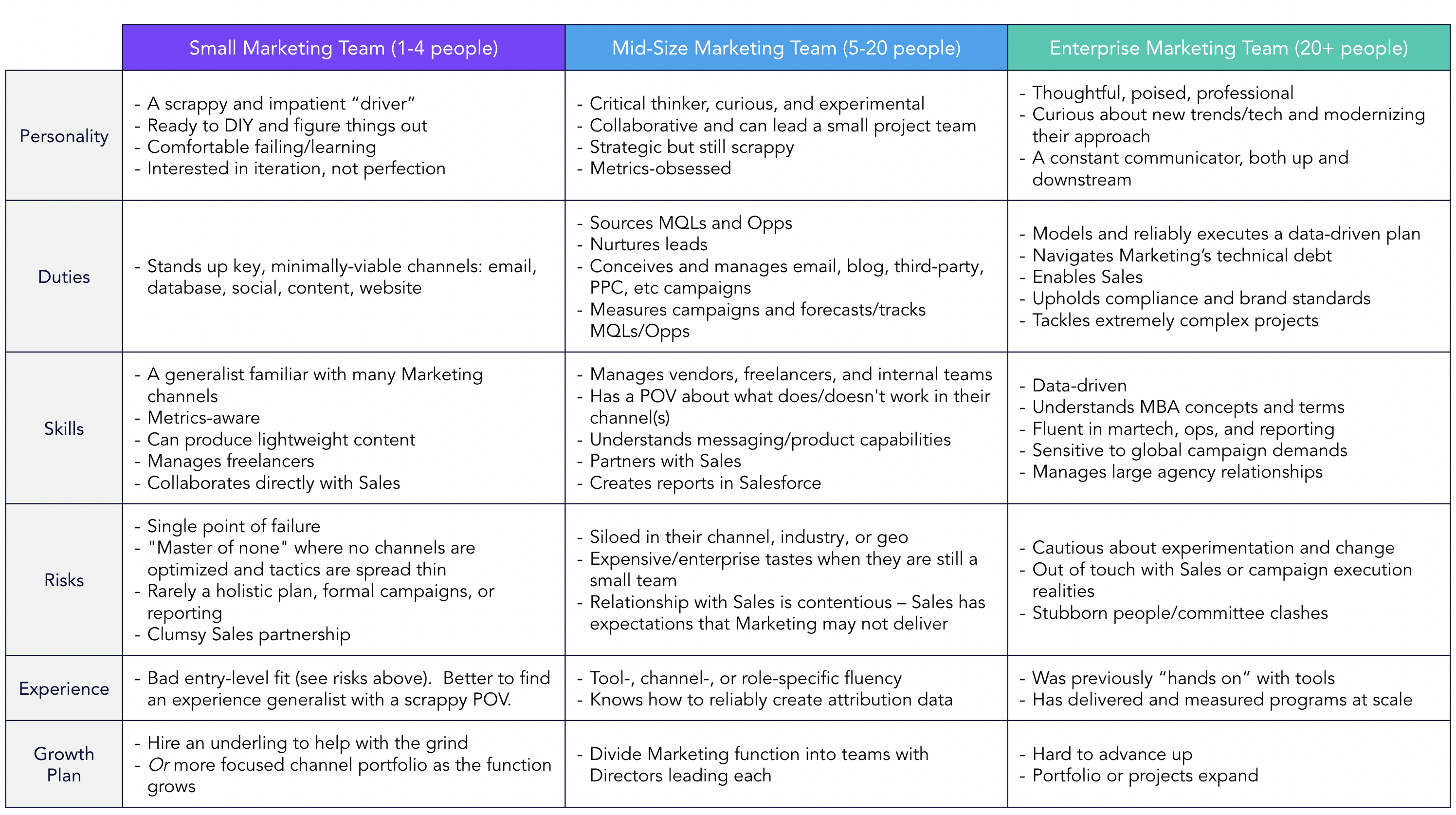Marketing leadership roles and responsibilities have changed dramatically in the last decade, and the mix of people you need on your marketing team is very different than in the past. There are new roles and skill sets, new technologies, new mindsets and biases. When CEOs complain about their marketing leadership team, I’ve found it’s not necessarily the team is incompetent. It’s because the marketing team doesn’t have the right mix of skills to achieve the CEO’s revenue goals.
>> Related: Driving Sales and Marketing Alignment During Planning <<
At my previous company, we made a lot of mistakes building a marketing team that could grow from $10 million to $40 million in revenue. We hired the wrong people and had to let them go after too much time had passed. When I talk to other marketing leadership teams, they have similar stories.
In this post, I’ll share a team structure that works, including roles and responsibilities, org chart, and lessons learned. Of course, this certainly isn’t the only way to structure your marketing team. But I hope it helps you see the capabilities you need, regardless of how they’re organized.
In this post:
Sample B2B Marketing Org Chart
Here’s the org chart I’d use if I were starting a new marketing team today from scratch.


I’ve organized the team into three groups: 1) brand, 2) demand generation, and 3) product marketing. Each group is led by a Director, and the whole team is led by the CMO or VP of Marketing. This marketing team is comprised of the following 13 roles:
- VP of Marketing
- Director of Brand & Communications
- PR & Social Media Manager
- Customer Marketing Manager
- Marketing Events Manager
- Director of Demand Generation
- Marketing Campaigns Manager
- Digital Marketing Manager
- Marketing Operations Manager
- Content Marketing Manager
- Director of Product Marketing
- Product Marketing Manager
- Analyst Relations Manager
B2B Marketing Leadership Roles and Responsibilities
In this post, we’ll cover marketing leadership roles and responsibilities, namely the VP of Marketing and the group leaders. In the next three posts in this series, we’ll do a deep dive on each group to describe the various roles and responsibilities within them.
CMO/VP of Marketing
Your VP of Marketing is responsible for the company’s overall marketing strategy. That includes messaging, campaigns, and metrics. This person hires the talent that will execute on the marketing plan, and they’re a member of the executive team.
This is a key hire, so this person should have the right skills to fit your organization.
- Do you need to grow revenue? Then you need hire someone with a strong demand generation background.
- Are you having trouble telling your company story? Then you need to hire someone with a strong background in product marketing.
- Do you need to modernize your look & feel? Then look for someone more brand-oriented.
Someone once told me that when you’re recruiting a VP of Marketing, you’re looking for a mix of three skills – brand, demand gen, and product marketing – but you only get to pick two. It’s *very* rare to find all three in one person, so you’ll need to decide what’s most important for your company in the current stage.
Key Roles and Responsibilities:
- Create, communicate, and execute the company’s marketing strategy
- Support Sales through comprehensive demand generation programs. This may or may not include management of the business development team
- Craft the company’s story. Manage consistent communications of the marketing message with press, analysts, and the market at large
- Own the the company’s brand, including the look & feel of all branded assets and web properties, as well as any content or touch points along the buyer’s journey
- Manage the marketing budget to ensure efficient spend across programs
- Develop quantifiable objectives, and measure results and ROI
Director of Brand & Communications
The Director of Brand & Communications is your brand champion. They’re creative, have a strong eye for design, focus on the big picture, and manage major projects with a lot of stakeholders. They’re also a bit of a stickler. That’s a good thing – because you need someone bullish to set brand standards and push the rest of the org to be consistent. This person also works closely with the VP of Marketing to formulate the marketing message. They’ll translate that into the corporate website, press relations, and other corporate comms within their domain.
Key Roles and Responsibilities:
- Work with internal stakeholders to formulate the company story and craft messaging in response to new competitive positioning, product releases, etc.
- Manage the corporate website to present the marketing message in a visually compelling way (note: usually in conjunction with an agency for development support)
- Expand company awareness through the press, social media, and events
- Own the consistency of all touch points along the buyer’s journey, with a particular focus on customer engagement and happiness
Director of Demand Generation
The Director of Demand Generation is where the rubber hits the road for Sales. They’re energetic, analytical, ruthlessly efficient, and detail-oriented. This person is a truth teller and relies on data to make decisions, But they can build great relationships with Sales and push back on dumb ideas. Ultimately they have to have a service orientation to support Sales. This person owns the plan, execution, and analysis of all marketing campaigns that generate leads and opportunities. They also work closely with Sales to ensure leads are followed up with promptly.
Key Roles and Responsibilities:
- Plan and execute demand generation campaigns across all channels. This includes email, paid search, display advertising, content syndication, social, etc.
- Own the marketing prospect database. Improve the size and quality of contacts to support future marketing campaigns
- Analyze campaign effectiveness and maximize Marketing ROI
- Manage the marketing automation system and integration with the CRM to ensure the right information is captured to handoff leads to Sales and attribute campaign success
- Own the content calendar to support demand generation efforts across channels
Director of Product Marketing
The Director of Product Marketing is ensures the company’s products and services resonate with the target market. They’re highly intelligent, creative, strategic thinkers. They can translate convoluted technical concepts into easy-to-understand frameworks. They’re the “thought leaders” of the organization, in that they’re generating the “thoughts” that the rest of the marketing team will distribute inside and outside the company. They interface directly with clients and report back to product management. They monitor the competitive landscape and marketing trends. And they’re responsible for the ever-misunderstood sales enablement to support new messaging, product launches, and other marketing campaigns.
Key Roles and Responsibilities:
- Plan product launches for all new products and releases and coordinate with Product Management, Marketing, and Sales to execute a successful launch
- Conduct regular, in-depth competitive analysis to ensure the marketing and Sales teams are aware of new developments so they can speak more credibly with prospects
- Develop all Sales tools, including value propositions, competitive positioning, launch scripts, customer proof points, ROI metrics and calculations
- Develop thought leadership for use in bylines, corporate messaging, and other content
In the second post in this series, we dive into the brand & communications group to describe the roles and responsibilities for driving brand awareness and managing consistent corporate comms.
Planning doesn’t have to be painful. This 42-page workbook helps you comb through campaign stats, coordinate the team, and answer marketing’s toughest questions: What worked? What content do you need? And what can you afford?



